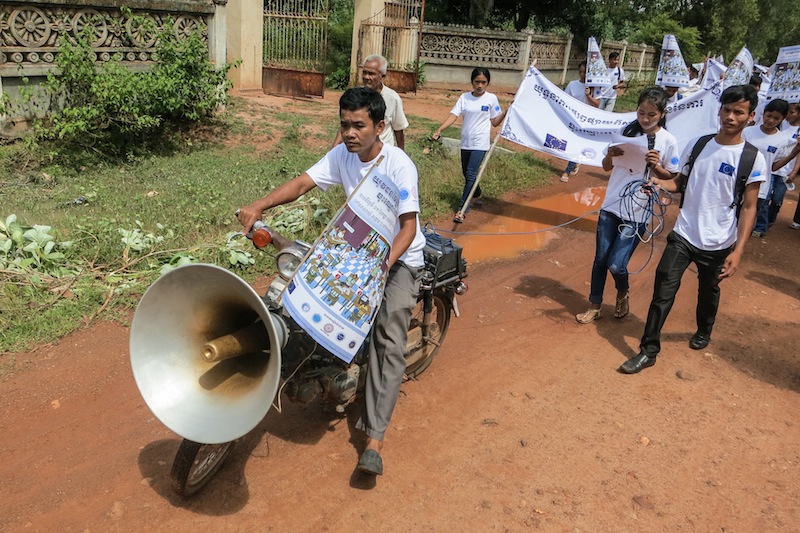Amid its final push for voter registration—the deadline to get on the rolls is Tuesday—the CNRP is ruing the disenfranchisement of workers living abroad, saying their support would be decisive for the opposition.
The party has blasted the National Election Committee (NEC) for failing to make any effort to ease the voting process for Cambodians working abroad, but a senior lawmaker also lamented that the CNRP did not push harder for such provisions during negotiations over the new election law.

“NEC has literally not tried to be flexible,” CNRP public affairs director Mu Sochua said in an email this week. “They keep referring to the electoral law, but the procedures could be more flexible and work around the law. They have done it for the military stationed outside of their home towns.”
Confronted with the prospect of losing as many as 2 million potential voters, Ms. Sochua said she regretted that the party had not tried harder to open channels for migrant voters in the laws negotiated with the ruling CPP after mass opposition protests over irregularities in the 2013 national election.
“During the negotiation we were too quick to accept the CPP’s deal,” she said. “Now we have to bear the consequences. Hopefully there will be another period of registration for 2018.”
As part of the electoral reforms, the CPP and CNRP established a new election commission, composed of four members selected by each party and a ninth neutral member, Hang Puthea, who also serves as the body’s spokesman. The move was meant to ensure neutrality in coming elections.
CNRP spokesman Yim Sovann on Wednesday pleaded for the NEC to make selective extensions to the registration deadline.
“Please, delay the voter registration [deadline] at some places,” Mr. Sovann said at the party’s headquarters on Wednesday, echoing recent calls by his colleagues.
In two western provinces bordering Thailand—Battambang and Banteay Meanchey—just 66 percent of eligible voters are registered, likely reflecting the large numbers of residents there who have crossed the border to work.
Mr. Puthea, the NEC spokesman, said one reason for the low turnout in the two provinces was that some migrants had returned from Thailand to register, but were turned away for lack of proper documentation.
“Some did not have enough documents, so election officials and local authorities did not allow them to register,” Mr. Puthea said, adding that any decision about extending the registration deadline would only be made after it passed.
In order to remedy the issue of hundreds of thousands of migrant workers being disenfranchised, the CNRP has suggested setting up voting stations along the Thai border as well as in embassies in other countries, such as Malaysia and South Korea.
CNRP President Sam Rainsy estimated the number of potential voters working abroad to be 1.5 million, and said the group could swing as many as 18 seats for the opposition in the 125-seat National Assembly when national elections are held in July 2018.
“After the last national elections in 2013, in spite of all the irregularities working in their favor, the CPP (with 68 seats) leads the CNRP (55) by only 13 seats,” he said in an email.
CPP spokesman Sok Eysan denied that anyone was dragging their feet to prevent Cambodians living overseas from casting their ballots.
“It’s their opinion to say it’s a matter of political gain, but it’s not the case that 100 percent of people abroad vote for the CNRP,” Mr. Eysan said. “They just say it to look good.”
He said ruling party officials at all levels were working to encourage people to register, but added that those efforts must not go beyond the election law.
“We cannot create any registration offices along the border because it’s against the law,” he added.
(Additional reporting by Kuch Naren)



